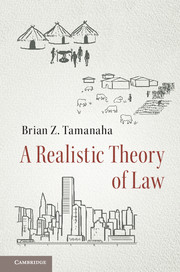Crossref Citations
This Book has been
cited by the following publications. This list is generated based on data provided by Crossref.
Tamanaha, Brian Z.
2017.
Necessary and Universal Truths about Law?.
Ratio Juris,
Vol. 30,
Issue. 1,
p.
3.
Burgess, Paul
2017.
Neglecting the History of the Rule of Law: (Unintended) Conceptual Eugenics.
Hague Journal on the Rule of Law,
Vol. 9,
Issue. 2,
p.
195.
Postema, Gerald J.
2018.
Time in Law's Domain.
Ratio Juris,
Vol. 31,
Issue. 2,
p.
160.
JAMAL, Arif A
2018.
Religion and Constitutional Practices in Asia: Five ‘Cs’ for Reflection.
Asian Journal of Comparative Law,
Vol. 13,
Issue. 2,
p.
219.
Bódig, Mátyás
2018.
Legal Validity and Soft Law.
Vol. 122,
Issue. ,
p.
221.
Schnyder, Gerhard
Siems, Mathias
and
Aguilera, Ruth V.
2018.
Twenty Years of 'Law and Finance': Time to Take Law Seriously.
SSRN Electronic Journal,
Siliquini-Cinelli, Luca
2019.
Legal Positivism in a Global and Transnational Age.
Vol. 131,
Issue. ,
p.
1.
van Krieken, Robert
2019.
Law and Civilization: Norbert Elias as a Regulation Theorist.
Annual Review of Law and Social Science,
Vol. 15,
Issue. 1,
p.
267.
2019.
The Nature of International Law.
p.
1.
Hahn, Judith
2019.
Grundlegung der Kirchenrechtssoziologie.
p.
29.
van Schilfgaarde, Peter
2019.
Law and Life. Why Law?.
p.
135.
Hahn, Judith
2019.
Grundlegung der Kirchenrechtssoziologie.
p.
81.
SILIQUINI-CINELLI, Luca
2019.
Societal Constitutionalism in Japan: Neighbourhood Associations as Micro-relational Constitutional Sites.
Asian Journal of Law and Society,
Vol. 6,
Issue. 2,
p.
249.
GOLDONI, MARCO
2019.
Introduction to the material study of global constitutional law.
Global Constitutionalism,
Vol. 8,
Issue. 1,
p.
71.
van Schilfgaarde, Peter
2019.
Law and Life. Why Law?.
p.
13.
Siliquini-Cinelli, Luca
2019.
Legal Positivism in a Global and Transnational Age.
Vol. 131,
Issue. ,
p.
123.
Jovanović, Miodrag A.
2019.
The Nature of International Law.
Hahn, Judith
2019.
Grundlegung der Kirchenrechtssoziologie.
p.
1.
Dabetić, Valerija
2020.
"Legality" of the Legal Order in Postwar Serbia From 1944 to 1946: Organization and Work of the Judiciary.
Anali Pravnog fakulteta u Beogradu,
p.
158.
Fisher, Elizabeth
and
Shapiro, Sidney A.
2020.
Administrative Competence.





